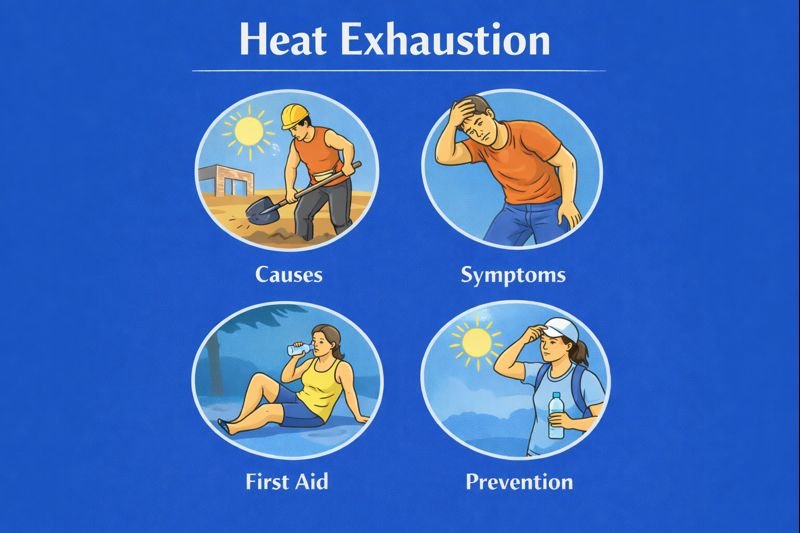Heat Exhaustion: Causes, Symptoms & Heat Safety Awareness

Relevance in Canadian Workplaces, Sports & Summer Activities
Heat exhaustion can affect workers, athletes, outdoor volunteers, gardeners, and anyone active in warm, humid conditions. During Canadian summer heat waves, humidity and limited airflow can reduce the body’s ability to cool through sweating.
Scenario (Mild & Realistic)
During a July construction shift, Kai began feeling weak and nauseous after several hours outdoors. The crew lead encouraged everyone to take a break in the shade, drink fluids, and cool down before resuming work at a slower pace.
Causes & Contributing Factors
Heat exhaustion can develop when:
-
The body works hard in hot or humid conditions
-
Fluid and electrolyte losses aren’t replaced during sweating
-
Humidity prevents sweat from evaporating
-
Heavy workloads or intense exercise reduce cooling opportunities
Related factors may include:
-
Wearing heavy or non-breathable gear
-
Unacclimatized activity early in the season
-
Returning to exertion after illness or inactivity
Symptoms of Heat Exhaustion
Common symptoms may include:
-
Dizziness or lightheadedness
-
Fatigue or weakness
-
Headache
-
Muscle cramps or aches
-
Nausea or vomiting
-
Faster breathing or heart rate
-
Mild confusion
-
Blurred vision
These symptoms often appear during or shortly after activity in hot environments.
Who Is at Higher Risk?
Heat exhaustion can affect anyone, but increased risk can occur in:
-
Outdoor and industrial workers
-
Athletes and recreational runners
-
Older adults
-
Young children and infants
-
Individuals using medications that affect sweating or temperature regulation
-
People who sweat heavily or have not acclimatized to heat
-
Individuals consuming alcohol before or during heat exposure
Management & First Aid Awareness
Public first aid awareness for heat exhaustion focuses on rest, cooling, and hydration:
-
Pause activity and move to a cooler or shaded area
-
Sip fluids gradually to support rehydration
-
Remove heavy gear or layers if appropriate
-
Cool the skin with shade, breezes, or cool cloths
-
Reintroduce activity slowly after symptoms subside
Persistent symptoms or difficulty replacing fluids may require medical assessment.
Prevention & Heat Safety Considerations
To help prevent heat exhaustion:
-
Hydrate before, during, and after activity
-
Modify activity levels during heat waves
-
Take scheduled shade and cooling breaks
-
Wear lightweight, breathable clothing
-
Avoid peak heat hours when possible
-
Increase workload gradually during warm seasons
Canadian workplaces may use heat stress policies to protect workers during extreme heat events.
FAQ
Is heat exhaustion the same as heat cramps?
No. Heat exhaustion involves more extensive fluid and electrolyte loss and can include systemic symptoms such as nausea and dizziness.
Does heat exhaustion only affect athletes?
No. Outdoor labourers and individuals doing summer chores or recreation can also be affected.
Can heat exhaustion progress to something more serious?
Yes. Without cooling and hydration, heat illness can worsen. Awareness and early rest help reduce risk.
Does humidity matter?
Yes. High humidity reduces sweat evaporation, making it harder for the body to cool.
Educational Note
This article supports public and workplace education about heat exhaustion and heat stress awareness. Individual responses and hydration needs vary. Trained health professionals can assess concerns that affect safety, performance, or daily activities.
